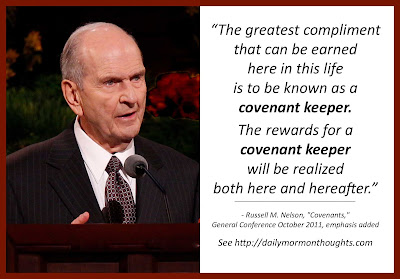"One of the most important concepts of revealed religion is that of a sacred covenant. In legal language, a covenant generally denotes an agreement between two or more parties. But in a religious context, a covenant is much more significant. It is a sacred promise with God. He fixes the terms. Each person may choose to accept those terms. If one accepts the terms of the covenant and obeys God’s law, he or she receives the blessings associated with the covenant. We know that 'when we obtain any blessing from God, it is by obedience to that law upon which it is predicated.' (D&C 130:21) ...
"Children of the covenant have the right to receive His doctrine and to know the plan of salvation. They claim it by making covenants of sacred significance. Brigham Young said: 'All Latter-day Saints enter the new and everlasting covenant when they enter this Church.... They enter the new and everlasting covenant to sustain the Kingdom of God.' (Teachings of Presidents of the Church: Brigham Young (1997), 62.) They keep the covenant by obedience to His commandments....
"When we realize that we are children of the covenant, we know who we are and what God expects of us. His law is written in our hearts. (See Isa 55:3.) He is our God and we are His people.(See Psalm 95:7.) Committed children of the covenant remain steadfast, even in the midst of adversity. When that doctrine is deeply implanted in our hearts, even the sting of death is soothed and our spiritual stamina is strengthened.
"The greatest compliment that can be earned here in this life is to be known as a covenant keeper. The rewards for a covenant keeper will be realized both here and hereafter."
- Russell M. Nelson, "Covenants," General Conference October 2011
Click here to read or listen to the full talk
President Nelson gives a wonderful summary of the doctrine of covenants in this address. He reminds us of the meaning of our sacred promises to God, of the obligations those promises imply, and of the blessings promised for fulfilling our part of the covenant in obedience to God.
The label "children of the covenant" occurs in that form in only one place in the scriptures (3 Ne 20:26) but the concept is described and implied in many others; I love the implications it offers for us as we enter into that special relationship with God. It gives us "the right to receive His doctrine and to know the plan of salvation."
What a wonderful achievement, to be known as one who keeps sacred covenants—according to President Nelson, the "greatest compliment that can be earned here in this life"!
(Compilation and commentary by David Kenison, Orem, Utah, 2018)

































